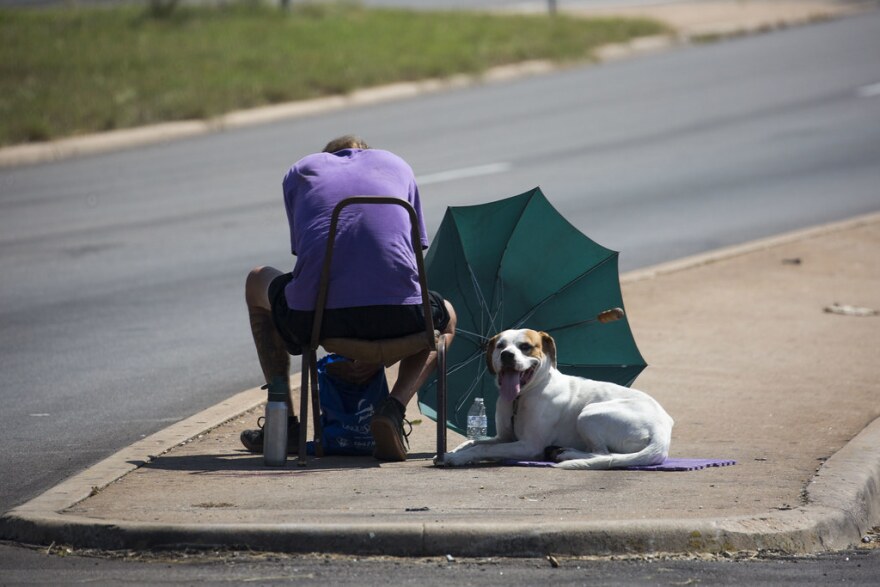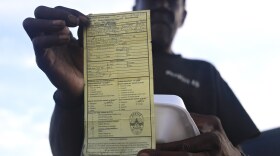The Austin City Council voted to scale back city rules on camping, panhandling and sitting or lying down in public. Council members heard hours of impassioned testimony on the ordinances at the tail end of a marathon meeting that stretched into early Friday morning.
"I know that changing these ordinances will be unpopular with some people. I'm not trying to downplay the challenges that we're going to face, but we can take on those challenges in a better way," Council Member Greg Casar said before the vote. "We can house people. We can serve people. We can address the core issues. We can improve all of our safety, rather than perpetuating instability and insecurity."
The council's decision pares down the ordinances, removing instances of specific behavior and intent on the part of those receiving Class C citations for actions like sitting or lying down on a sidewalk, sleeping in a car or asking people for money. The revisions lean on state law for enforcement in the case of the sitting and lying down and panhandling bans – adopting language that prohibits obstruction of a sidewalk and aggressive confrontation, respectively. Camping is still banned in public parks.
Police officers must give a warning before issuing tickets in the revised ordinances, which aim to curb public health and safety dangers and not expressly target behavior associated with homelessness.
RELATED | Most Tickets For Homelessness Result In Arrest Warrants. That Can Make Finding Housing Hard.
The vast majority of speakers Thursday night testified in favor of revising all three ordinances.
Opponents of the rules have argued they're unconstitutional, that they criminalize homelessness and that the tickets are a financial burden for both the recipients and the city itself. But supporters say the revisions could allow public health and safety issues to continue unabated downtown and in UT's West Campus area.
Kimberly Levinson, vice president of the Downtown Austin Neighborhood association, said she supported council's move earlier in the day to buy property for a new emergency homeless shelter in South Austin, but asked the city to postpone the ordinances' revision in favor of more input and stronger enforcement language.
"I really do believe that we are going to have some very ill effects from changing ordinances before we have new ones put in their place that protect people and make people feel safe walking around downtown Austin," she said.
Levinson also suggested the city hold off on revising the ordinances until City Manager Spencer Cronk identifies specific places for safe camping for homeless Austinites in August.
But David Johnson, an organizer with the nonprofit Grassroots Leadership, called the city's ordinances "modern-day racist oppression just broadened so that it's classist oppression." He said it's wrong for the city to punish homeless people for sleeping outdoors when the city doesn't have enough room in its emergency shelters.
"Austin created this problem. Austin created this problem by failing to protect the interests of, provide for and plan with the individuals who are most in need," he said, "while we were enjoying this wonderfully boundless expansion and growth and financial development period in which we were so proud."
RELATED | City Council Approves A New $8.6 Million Shelter For The Homeless In South Austin
The hourslong testimony got heated, with multiple council members admonishing attendees for jeering or shouting during testimony. Mayor Steve Adler said Austin is in a unique position, compared to other cities that have had to grapple with issues related to homelessness – largely on grander scales – like Seattle, Los Angeles and San Francisco.
"The conversation that we're having in this room is unlike any of the conversations that are happening in any of the public meetings in those cities," Adler said. "We still have an opportunity to take advantage of the fact that there's a collective will ... that does not exist the same way in those cities, because battle lines have been drawn."
Shortly before the final vote, those battle lines appeared on the dais, when District Council Member Ann Kitchen requested to vote on each revision separately. Alter then offered an amendment to pass the camping ordinance on first reading only, which would've delayed the vote until after the council's summer break. She said the city needed to better study sites for safe camping spaces and clear up language in the ban. Council Member Kathie Tovo seconded and Kitchen backed it, but her motion failed.
Mayor Pro Tem Delia Garza took offense to the last-minute move, saying she understood the concerns, but that council should've passed all three revisions as planned. She said the city as a whole needs to better deal with homelessness.
"The sense of being entitled to see things that we don’t like needs to stop," she said.
Ultimately, the revisions on the ordinances banning panhandling and sitting or lying down in public passed unanimously. Council members Tovo and Alter voted against the revision to the camping ordinance.
Earlier in the day, the council unanimously approved spending $8.6 million on property for a shelter in South Austin. Council also approved a resolution directing the city manager to seek out short-term solutions for homelessness, which would include finding locations for future temporary shelters in all 10 City Council districts, expanding cleanups under overpasses and increasing access to public restrooms. Cronk will return to Council with a report by Aug. 30.






